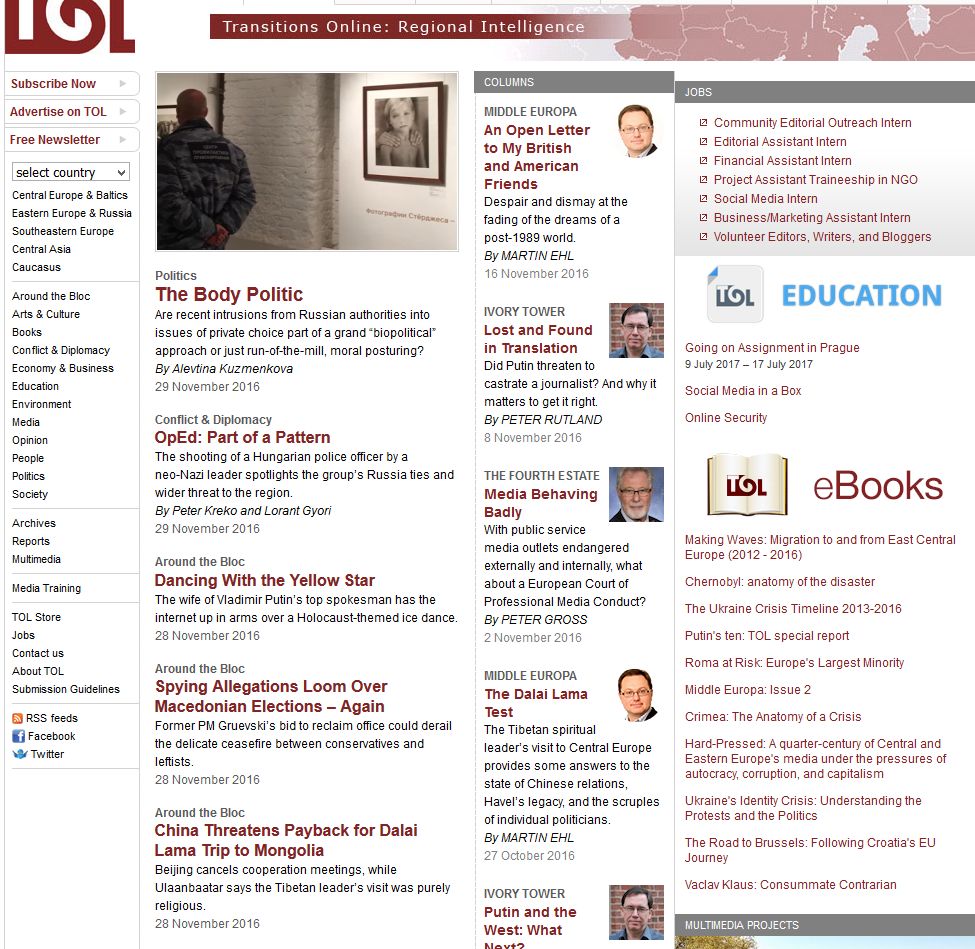
Around the Bloc: Romanian Senators Propose Amending ‘Books by Crooks’ Law
Prisoners can reduce jail terms by 30 days for each work of ‘scientific value’ they publish.
More...We kindly inform you that, as long as the subject affiliation of our 300.000+ articles is in progress, you might get unsufficient or no results on your third level or second level search. In this case, please broaden your search criteria.

Prisoners can reduce jail terms by 30 days for each work of ‘scientific value’ they publish.
More...
Citizenship defines the relationship between the individuals and the government in the modern society. The citizenship law had a long history in the world, in central Europe, Hungary published its first citizenship law in 1879. After the independent, Czechoslovakia and Poland had their own citizenship in 1920s. In China, Qing Dynasty also had its own nationality law in 1909. Although, these citizenship laws or nationality laws have some differences because of the different conditions in these countries, i.e. culture, economic condition. However, there are still have lots of similarity in these laws, the first and the most important principle similarity is jus sanguinis. Therefore, in this article the author will examine the first citizenship law in Hungary Kingdom, Czechoslovakia and Poland, the first nationality law in Qing Dynasty as well, and make comparison between these citizenship(nationality) law
More...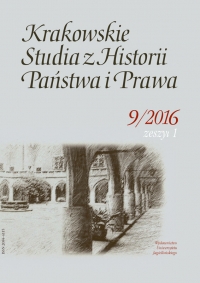
The symposium was held in Kraków on April 28th–29th, 2016, and it touched upon the subject of religion in the public sphere in the legal state of the 19th and 20th centuries. It was organised by the Chair of General History of Law and State at the Jagiellonian University. The participants were greeted by Prof. Dorota Malec, PhD, Vice Dean for Administrative Studies at the Faculty of Law and Administration of the Jagiellonian University (as well as the University’s Vice Rector-Elect for Development). The proceedings of the conference began with the inaugural speech delivered by Prof. Andrzej Dziadzio, PhD, Head of the Chair of General History of Law and State at the Jagiellonian University in Krakow. As many as 15 lecturers from 5 countries (Poland, Hungary, Germany, Austria, and the USA) contributed to the discussions. Each day of the symposium was divided into two sessions. The papers presented focused on the problem of relations between the church and the state throughout the 19th century, the inter-war years, and the post-war period, as well as on such problems as the secularisation of marriage law, protection of religious feelings, the status of church-affiliated organizations, and others issues concerning church/state law and religious policy. Special attention was given to the legal systems of the Austro-Hungarian Empire, the successor states of the Habsburg Monarchy, and the German legal environment.
More...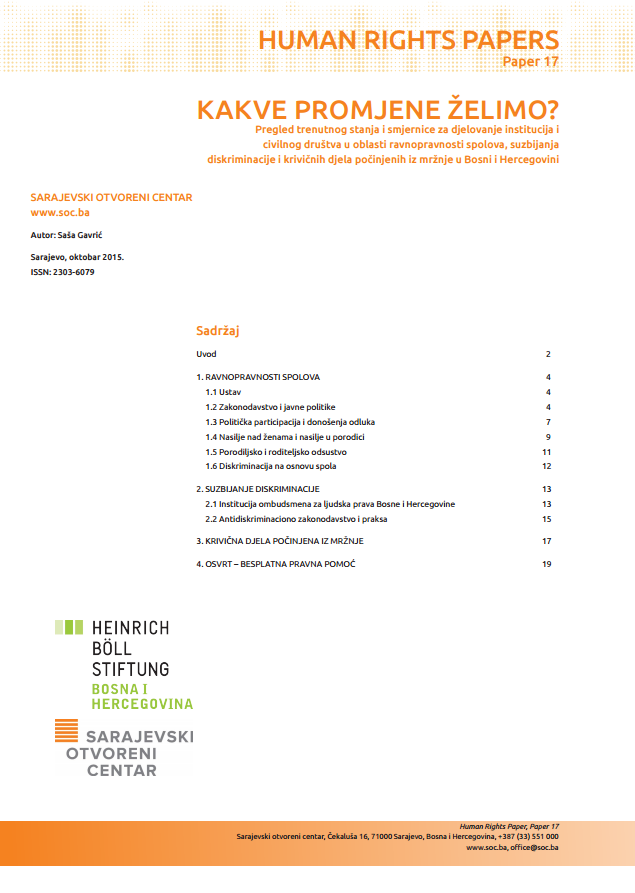
Bosna i Hercegovina treba izraditi i usvojiti višegodišnji Nacionalni akcioni plan/program za zaštitu i promociju ljudskih prava. Kroz interresornu grupu (sa predstavnicima/ama parlamenata i vlada sa državnog i entitetskog nivoa, ali i organizacija civilnog društva) i intenzivne javne konsultacije treba odrediti prioritete za narednih nekoliko godina, koji će se provoditi na različitim nivoima vlasti. Među prioritetnim oblastima svakako se moraju naći pitanja ravnopravnosti spolova, suzbijanja diskriminacije i suzbijanje krivičnih djela počinjenih iz mržnje. Zaštita i promocija ljudskih prava ne smije trpjeti zbog etnopolitičkih i stranačkih blokada, nego se treba osigurati široka podrška reformama koje imaju za cilj da unaprijede prava manjina i deprivilegovanih grupa i pojedinaca/ki. Naročito u predstojećim reformama, u okviru EU Reformske agende, bosanskohercegovačke elite trebaju pažljivo razmatrati i pitanja ljudskih prava. Političke stranke trebaju izraditi i usvojiti unutrašnje politike/programe za zaštitu i promociju ljudskih prava, prepoznajući značaj ovog pitanja te predlažući konkretna rješenja, zakone i politike. Ostvarivanje ljudskih prava velikim dijelom ovisi od pristupa pravdi. Sistem besplatne pravne pomoći potrebno je urediti sistemski, principijelno i okvirno kroz državni zakon o besplatnoj pravnoj pomoći, a službe za besplatnu pravnu pomoć treba učiniti dostupnim u svim opštinama i gradovima u BiH.
More...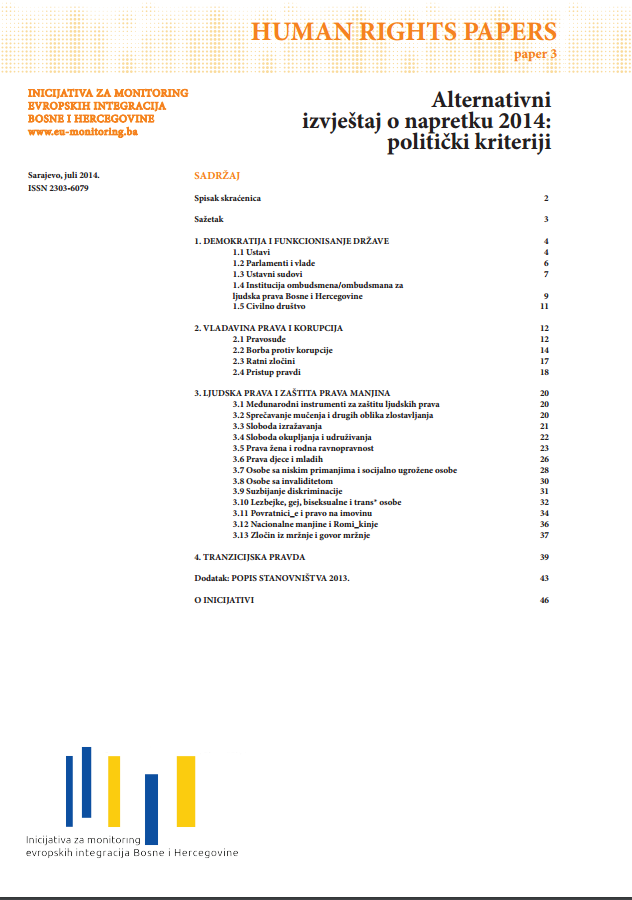
Pred vama se nalazi drugi Alternativni izvještaj o napretku Bosne i Hercegovine na putu ka članstvu u Evropskoj uniji. Izvještaj predstavlja zajednički napor više desetina osoba i organizacija, čiji je zajednički cilj bio da se iz ugla organizacija civilnog društva predstavi aktuelno stanje integracija Bosne i Hercegovine. Imajući na umu da je zvanični Izvještaj o napretku politički izvještaj Evropske komisije, mišljenja smo da kroz objavljivanje Alternativnog izvještaja možemo uticati na njegov sadržaj. Upravo zbog toga, Alternativni izvještaj objavljujemo skoro tri mjeseca pred objavljivanje zvaničnog Izvještaja, u nadi da će to imati uticaja na formuliranje zvaničnog Izvještaja. Izvještaj se u potpunosti fokusira na tzv. političke kriterije, sa fokusom na pitanja: - stepena demokratičnosti i funkcionisanja države, - vladavine prava i korupcije, - ljudskih prava, naročito prava manjinskih i ranjivih grupa, i - tranzicione pravde. Svjedoci smo da tokom 2013. i 2014. godine nije postignut nikakav relevantan napredak. Proces provedbe odluke Sejdić i Finci protiv Bosne i Hercegovine je u potpunosti izmješten iz Parlamenta. Demokratske performanse parlamenata i vlada na državnom, entitetskom i kantonalnom nivou su izrazito slabe. Rad institucija odlikuje nestabilnost, netransparentnost i neefikasnost. Odluke ustavnih sudova se i dalje ne provode. Nikakve značajne i sistematske politike za borbu protiv kršenja ljudskih prava nisu usvojene. Reforme pravosuđa su zaustavljene, a Strukturirani dijalog za pravosuđe između BiH i EU ne pokazuje napredak. Ni jedan značajan slučaj borbe protiv korupcije nije procesuiran. Manjinske i ranjive grupe žive i dalje u teškim uslovima. Diskriminacija i nasilje su sveprisutni, a sam Zakon o zabrani diskriminacije nije pokazao očekivane rezultate, imajući na umu da su pet godina od donošenja Zakona donesene samo dvije pravosnažne presude. Sveobuhvatne anti-diskriminacijske politike za socijalnu integraciju ili ne postoje ili ukoliko postoje, onda se skoro pa ne provode. Poplave su još dodatno pogodile one najranjivije u društvu. Procesuiranje ratnih zločina i suočavanje sa prošlošću, kao preduslovi za kreiranje zdravog okruženja i gradnju zajedničke države, predstavljaju dodatni problem. Politička podrška ratnim zločincima od strane lidera političkih stranaka samo dalje dijeli već izrazito fragmentirano društvo. Nadamo se da će opšti izbori u oktobru 2014. godine (iako se održavaju po diskriminirajućim pravilima) donijeti stabilnije političke strukture, spremne da se suoče sa različitim problemima. Inicijativa za monitoring evropskih integracija BiH će svakako zagovarati promjene kada je u pitanju usvajanje novih zakona i politika, ali i provedba istih. Nadamo se također da će bh. vlasti ali i EU institucije podržati jaču poziciju civilnog društva unutar različitih foruma u okviru EU integracija BiH. Civilno društvo mora postati treći akter ovog procesa (pored države i EU institucija).
More...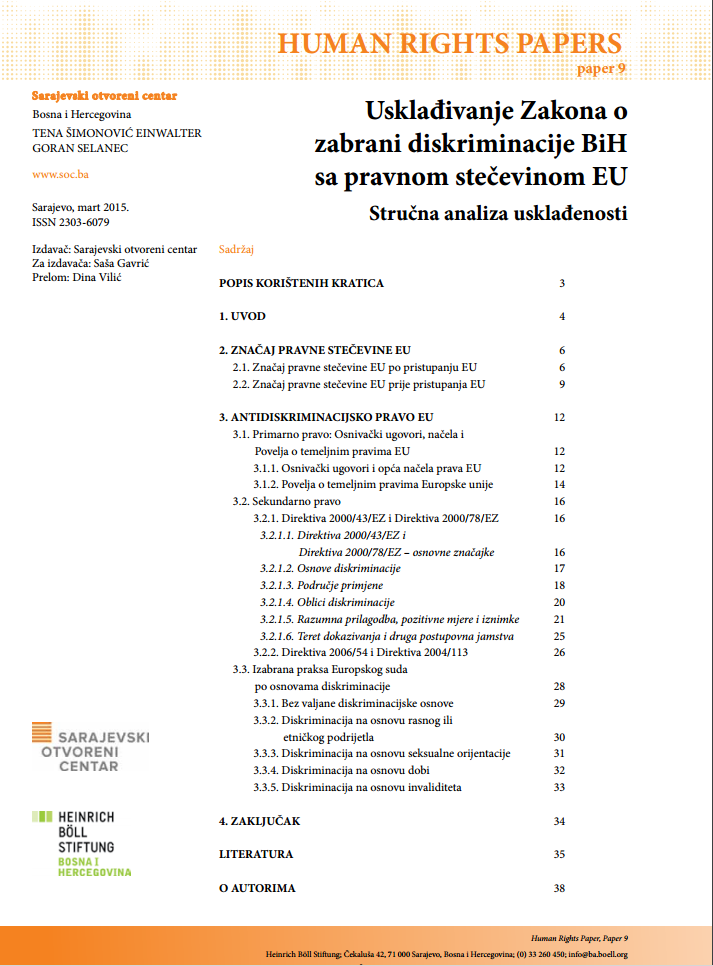
Diskriminacija je u pravnom sustavu Bosne i Hercegovine zabranjena na ustavnopravnoj razini, prvenstveno Ustavom BiH, zatim različitim međunarodnim ugovorima te nacionalnim zakonodavstvom, uključujući posebice Zakonom o zabrani diskriminacije. Ustav BiH u članku II: Ljudska prava i temeljne slobode nakon popisa prava navodi da se uživanje prava i sloboda utvrđenih tim člankom ili međunarodnim sporazumima koji su popisani u Dodatku I Ustava osigurava svim osobama u Bosni i Hercegovini, bez diskriminacije na bilo kojoj osnovi, poput spola, rase, boje kože, jezika, vjere, političkoga ili drugog mišljenja, nacionalnoga ili socijalnog podrijetla, pripadnosti nacionalnoj manjini, imovine, rođenja ili drugoga statusa. Glede međunarodnih ugovora posebno mjesto u ustavnopravnom poretku BiH ima Europska konvencija za zaštitu ljudskih prava i temeljnih sloboda (EKLJP). Ustav BiH u članku II: Ljudska prava i temeljne slobode navodi da Bosna i Hercegovina i oba entiteta osiguravaju najvišu razinu međunarodno priznatih ljudskih prava i temeljnih sloboda, a potom se posebno ističe da se prava i slobode utvr- đeni u Europskoj konvenciji za zaštitu ljudskih prava i temeljnih sloboda te njezinim Protokolima izravno primjenjuju u Bosni i Hercegovini i imaju prvenstvo pred svakim drugim zakonodavstvom.
More...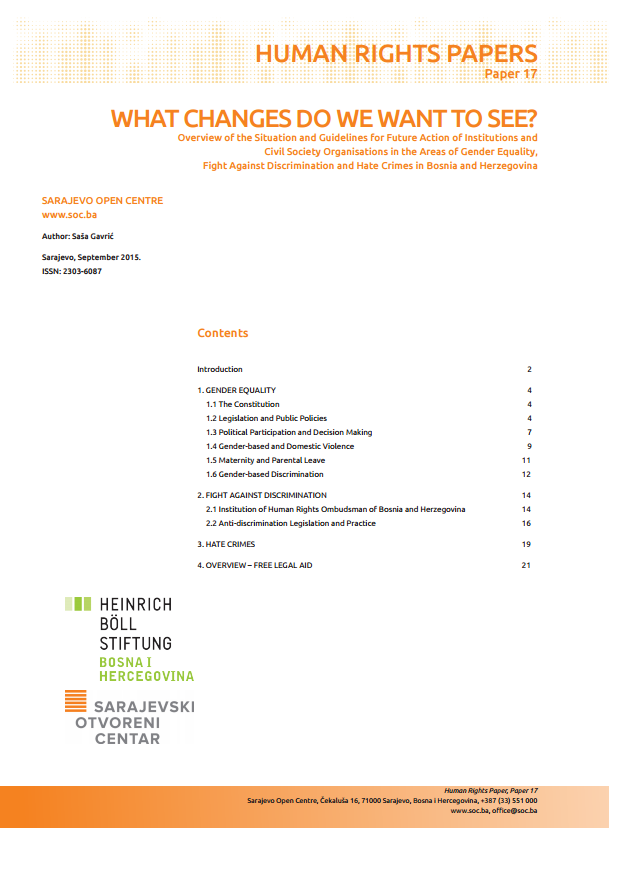
Bosnia and Herzegovina differs from most neighbouring and European countries on its approach to the issues of human rights and the rule of law. Although the most important international human rights protection and promotion documents, including the European Convention for the Protection of Human Rights and Fundamental Freedoms, are included in the BiH Constitution, the situation in the field is far from ideal.
More...
An attempt to contextualize the political power structure in Nigeria exposes an orientation and practice that directly negates the democratic norm of power belonging to the people. Today, power belongs entirely to government officials who use it to advance the course of their political and economic interests. The people are thus, subjected to the point and path of complete alienation from the demands and benefits of their democratic citizenship. Given the weakness of the rule of law and institutions of check in Nigeria, established statutes and legislation have not been able to stand tall to relevance in dislodging the hegemony of the ruling elites as is evident in our case study- Imo State. This has since 1999, propped up a telling political effect, which also spirals to the arena of development, and quakes the stability of the state, and the nation at large. The paper examines the current domiciliation of political power, its potential effect on the people, and on service delivery in the country. A case is made for recovery of power for the people and reasserting the law as a balancing force and as means of providing check against breach of constitutionally prescribed political power structure and configuration.
More...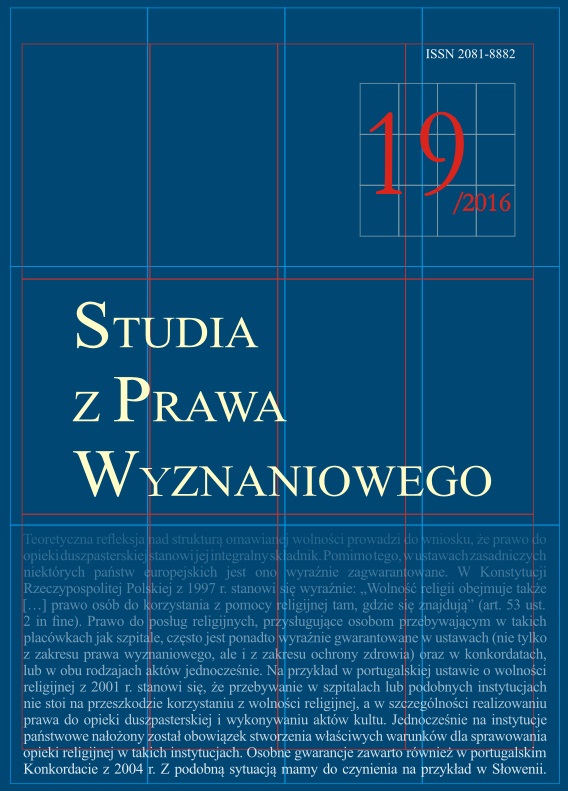
Immigration in to-days Europe is a huge problem. The phenomenon is potentially dangerous for the national, cultural and religious status quo of Poland. According to the Polish law, freedom of religion shall be ensured for everyone, who is under Polish law. The freedom of religion includes the right of possession of sanctuaries. The right in question is granted to every Church or religious organization. In exercising the right, there is no distinction, if or in what legal way a Church or religious organization is recognized by Polish law. It means, that there is no direct legal way to prevent immigrants from building shrines. The newly updated law of 2003 about planning and developing of spatial (ustawa o planowaniu i zagospodarowaniu przestrzennym) contains the provisions about so called “priority landscape”. The regulations in question can be used, by the local authorities, to prevent changing the landscape, e.g. of a town, by banning building a shrine with certain architectonic elements. The ban cannot be classified as an infringement of religious freedom, but only as a limitation of exercising it. The ban is fully justified by the rights of autochthons to maintain the national or religious cultural heritage.
More...
The subject of this article is to present the issue of compliance of regulations concerning students’ exemptions from school classes in order to participate in Lent retreat with the rule of equal rights of churches and other religious associations. While analyzing these issues the author comes to a conclusion that dependence of obtaining right to exemption from school classes on requirement of pledging participation by students in school religious education is discriminative and violates the constitutional rule of equality towards law and it is not in accordance with the rule of equal rights of churches and other religious associations. Moreover it causes discrimination of students since it creates conditions to obtain subject exemptions only for those students who belong to Christian denominations. The author demands that participation in religious education as a subject of school education shall not be associated with a duty of performing by students particular religious observances as a retreat is not an element of school education conducted within the educational system. The right to possible obtainment of exemptions by students for participation in a retreat should be regulated not in educational law but in a legal act referring to religious freedom of individuals.
More...
As a result of existing research and case–law of the courts, it should be noted that the source of the normative for conscientious objection is a human right to freedom of conscience and religion. This follows from the case law of the ECHR and the Polish Constitutional Court, especially the judgment of the Constitutional Court in case no. No. K 12/14. This article complements the arguments of the relationship of conscientious objection to the prohibition of discrimination. The principle of equality and the related prohibition of discrimination applies in the case of conscientious objection. As a result of the research proved that the profession / work can not be a negative condition for differentiating and discriminating. Directly violates the prohibition of discrimination, which also includes discrimination in the case of work or profession.
More...
The article concerns the problems of copyright protection of religious works. Problems that were presented in the article are: restriction of religious freedom under the copyright law, copyright protection in the light of canon law, the ability of religious works for copyright protection, the interpretation of Article 31 of the Law on Copyright and Related Rights regarding fair use works as part of religious ceremonies, the right to reprint articles on religious topics, exploitation of speech and sermons presented at public meetings and exposure to public view works of art and architecture on religious themes.
More...
The subject matter of the present paper is the issue concerning military service of Jehovah’s Witnesses. The author mainly focuses on legal regulations and analysis of judicial decisions, nevertheless, the most important aspects of Jehovah’s Witnesses teaching are also included. The article presents the evolution of legal regulations as well as the standpoint of jurisdiction in this particular area. The permission to refuse military service of Jehovah’s Witnesses had not been granted by either the legislator or the court until the period of system shift. As it is emphasized by the author, problems that arise due to the existing regulations and their practical implementation are believed to become a redundant debate, especially when common military service obligation is suspended. However, in the light of existing threats it cannot be excluded that the military service obligation will be implemented.
More...
In this text, the way of realization of the equality principle of churches and religious associations towards the state is introduced. The principle is one of the most essential in the system of the contemporary Polish religious law in relation to the functioning of the priesthoods in the national penitentiaries.
More...
The article discusses the issues related to the manifestation of religious beliefs in the workplace on the basis of the case law of the European Commission of Human Rights and the European Court of Human Rights. It highlights the specificity of the judgment in Eweida and others against the United Kingdom in the light of the previous jurisprudence of the Strasbourg authorities. In an earlier case law, the Court accepted the principle according to which the ability to opt out of work is sufficient protection for employee’s religious freedom and therefore there is no violation of the rights guaranteed by Article. 9 of the European Convention on Human Rights. Therefore the Court's case law does not adequately protected employee’s religious freedom. In the judgment in Eweida and others against the United Kingdom, the Court stated that it can not continue applying this principle and replaced it with a test of proportionality, according to which will analyze limitations imposed on the employee's in the context of the legitimate aim of the restrictions and the proportionality of the measures used for its achievements. Further application of this principle and the importance of this judgment will be seen in the light of future case law.
More...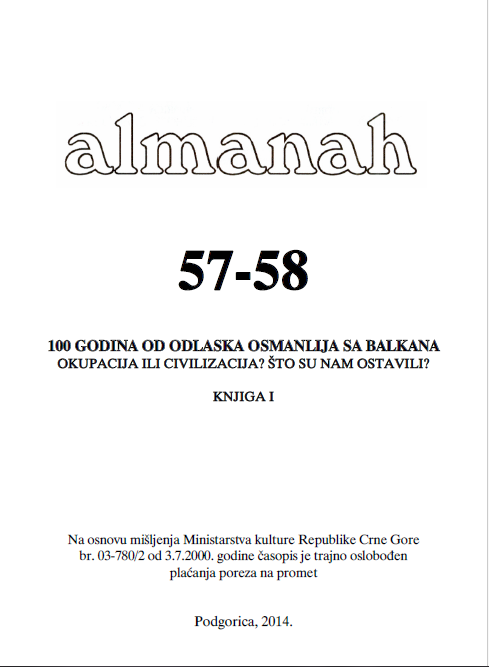
Kao što je poznato današnji teritorij Crne Gore bio je pod osmanskom vlašću četiri stoljeća. Osmansko carstvo figuriralo je kao islamska država gdje se primijenjivalo islamsko, tj. šerijatsko pravo. Ono je tokom višestoljetne vladavine, kod domaćeg stanovništva formiralo određenu pravnu svijest i običajno pravo. Iako je Opšti imovinski zakonik donešen i zvanično proglašen 1888. godine, njegov autor Baltazar Bogišić, petnaest godina je prikupljao pravne običaje u staroj Crnoj Gori, Hercegovini, južnoj Dalmaciji i području Skadarskog pašaluka. Sve su to prostori kojima su, kraće ili dulje, vladali Osmanlije i ostavili traga u pravnim običajima spomenutih prostora. Dakle, postojeći pravni običaji poslužili su kao građa i pravni osnov Baltazaru Bogišiću za izradu Opšteg imovinskog zakonika. On nije utvrđivao niti istraživao porijeklo pravnog običaja. Za njega je bila važna činjenica da dotični pravni običaj egzistira u narodu, primjenjuje se i da je dio pravne svijesti lokalnog stanovništva. Šerijatsko-pravne ustanove koje su se etablirale u običajno pravo lokalnih zajednica na Balkanu, pa i u Crnoj Gori, ponekad su zadržale svoj arapsko-osmanski naziv, ili su nazvane jezikom lokalnog stanovništva. Ovaj rad ima za cilj istražiti koje su šerijatsko-pravne ustanove i propisi imali utjecaja na Opšti imovinski zakonik za Crnu Goru.
More...
The article focuses on factors that influence the government size, in literature known as revenue- maximizing Leviathan using the instrument of taxing. The theory admits two possibilities how to constrain the tax maximizing incentives of the “beast”, constitutional constraint and intergovernmental competition. Investigation on Leviathan´s determinants is made using the cluster analysis of 30 European countries during the period from 1995 to 2014. After segmentation of countries into five clusters the regression models of fixed effects and random effects using panel data were estimated for each cluster. The influence of public deficit on Leviathan seems to be stable and negative. The influence of redistribution needs reflecting the population out of working age and country size on Leviathan is significant but varies depending on cluster. The importance of fiscal decentralization, which is according to overwhelming literature considered as a main constraint to the Leviathan, is feeble. The article is published within project VEGA no. 1/0559/16.
More...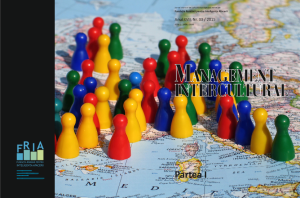
The insurance of the right to protection of health is regulated as obligation of the signatory states in the main international and European documents related to fundamental rights, in the constitutions of these states and in their infra-constitutional laws. In Romania, the right to protection of health is regulated at article 34 of the Fundamental Law, its standards of protection, stipulated in the international and the European acts that our country is part to, obliging the Romanian state, through the constitutional dispositions of article 20 and article 148 paragraphs 2, as well. In application of article 34 of the Constitution, there were adopted at national level Law no.95-2006 concerning the reform in the field of health and other normative acts referring to sub domains of public health. A specific form to guarantee the right to protection of health, for each country, is the one realized by criminal law stipulations.
More...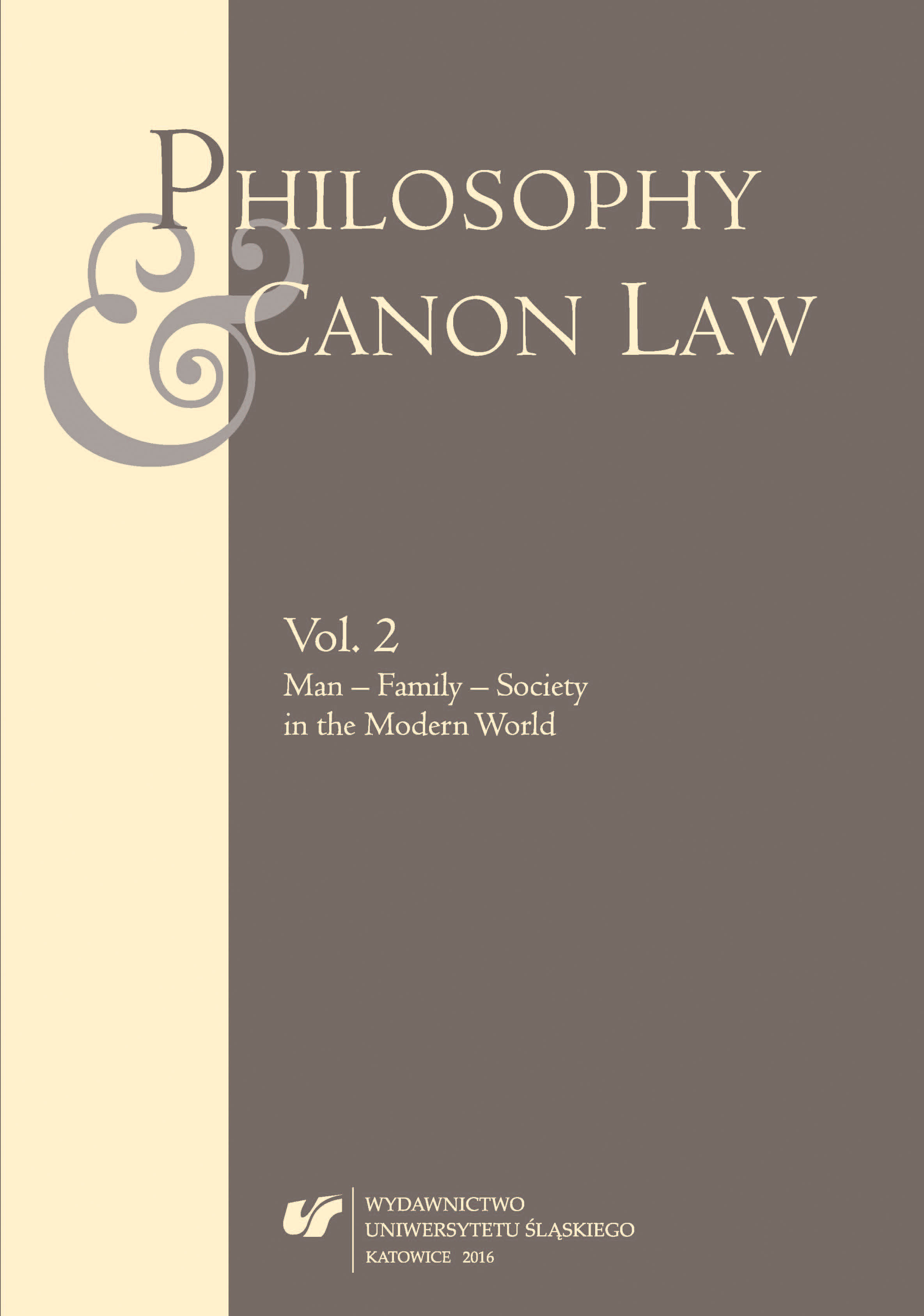
The Gaudium et Spes Constitution names a lot of rights and duties of a humanperson. They have emphasized the constant teaching of the Church on the interdependency ofrights and duties. This paper poses a question about the possible influence of the Constitutionon the formulation of the rights and duties of the faithful which were laid down in the Code ofCanon Law. This influence can be noticed, in particular, in the ideological layer of the unshakeable conviction of the Church about the interdependency of rights and duties, in the possibility of limiting the rights and, to a lesser degree, in the relation to specific formulations of the rights and duties, which stems from the diversity of the addressees of both documents.
More...
The article deals with the rights and obligations of the Catholic faithful, as specified in the Code of the Canons of the Eastern Churches (CCEO), compared with the Code of Canon Law from 1983 (CIC). It pays particular attention not only to the legal differences arising from the different legal schemes of matter and from different legal solutions, but traces the diverse theological accents contained in CCEO. These theological accents are enriched by brief description of the social accents, assessed in the light of the social doctrine of the Catholic Church, and this leads to a description and recognition of the very topical relevance of the legislation of the CCEO, focusing on life in a pluralistic society coupled with a high degree of intra-ecclesial, ecumenical, interreligious, and social cooperation.
More...